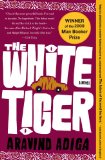Write your own review!
VaMpIreLuVeR
REALLY Worth IT
Wow. This book is simply amazing. It gave me a new view of India, and the conflict between the rich and the poor. :)
I highly recommend it!
Mary
OUTSTANDING
By far the BEST BOOK I have read in 2008. Extremely creative, at times funny, and a good luck at what it takes to be a "successful entrepreneur".
LOVED IT!
John Pierre
An unintended review
First, the book is generally well written and informative. I read it at one sitting and do not begrudge the time required.
Second, the major idea I drew from the book was Adiga’s metaphorical usage of the “rooster coop” to explain most of India’s socio-economic problems. Entending the metaphor I reviewed my own experiences and came to an unpleasant conclusion. The “rooster coop” phenomenon has in various guises, in differing circumstances, but fortunately with much less deadly consequences, made its own appearances within my own life, within my own family. My thanks to the author for the unintended reflection to which he has led me.
Rizwan
A mindblowing story
The White Tiger - it is a fabulous story. It is really about a real Indian Balram Halwai. I think this book must win Oscar also. :-)
jennie
White Tiger
I enjoyed the book,it was thought provoking and at times unsettling,at others warm and humorous. How realistic an account it is of Indian society today I don't know. Certainly the most readable Booker prize winner I've read to date.
 Cloggie Downunder
not quite a quality read
Cloggie Downunder
not quite a quality read
The White Tiger is the first novel by Indian author, Aravind Adiga. The narrative takes the form of a series of eight rambling emails sent over the period of a week from Balram Halwai aka Munna aka The White Tiger to Chinese Premier Wen Jiabao on the eve of his visit to India, and describes how Balram advanced from half-baked school boy son of a rickshaw puller to lowly teashop employee in Laxmangarh to chauffeur of rich Landlords in Delhi to fugitive wanted for the murder of his former employer to Bangalore entrepreneur. All this, under the guise of advising the Premier on producing much-needed entrepreneurs for China. Along the way, Balram comments on the divide in India between the rich and the poor, the powerful and the powerless, and details the bribery and corruption that are de rigeur in India. Adiga’s India is slums and sewage, shopping malls and traffic jams, call centres and cockroaches. As the main character, Balram is neither endearing nor wholly odious; in fact none of the characters will hold the reader’s interest for long. Some of Adiga’s descriptive prose is excellent, but this is not really enough to make this a “blazingly savage and brilliant” novel as described on the front cover. Winner of the Man Booker Prize for 2008, this is a pleasant enough read, at times blackly funny, but a far cry in quality from the works by those other Indian authors that won the Man Booker Prize in 1997 and 2006
Ramakanth
IT'S NOT WORTH A BOOKER PRIZE
It is very disappointing from a booker prize winner, the book has no information but only detail. The author just tried to increase the page count by describing a lizard, the paan 'spits'. There are many such descriptions in the book, which are really boring, disgusting and which don't add any value to the story.
Secondly, Arvind Adiga reinstated the trend of Indian booker prize winners just by bashing India more in this book. The story's narrator is highly pessimistic and he always points out the negatives of the Indian culture. He describes the characters in such a way that every Indian and every politician is corrupted and crooked. I did not like those sarcastic comments on Indians, Indian system and on Indian Leaders.
Moreover, the author did not take care of the sequences that occurred in the same time period. The author talks about Gavaskar, Azharuddin (who are veterans) - Bonded Labour - Slavery - Honda City, Cellphones, Traffic Jams in the same time period. This is a technical flaw that the author should have taken care of. Even a person without a brain never makes this blatant error while writing a book. The writer should have studied the today's typical Indian village properly. At least I advise him to learn it now so that he doesn't commit such mistakes in the future.
Finally, I can describe 'The White Tiger' as a book with very less information and more nonsense. It is not worth a Booker prize. I don't recommend one to go for this book. You can read if you want to waste Rs. 300 on it or if you have more time to waste, and if you don't like the books which educate you. If you read for 'time-pass' kind of thing, then yes, you can read 'The White Tiger By Arvind Adiga'. If you read something to learn something then please don't go for this book.
